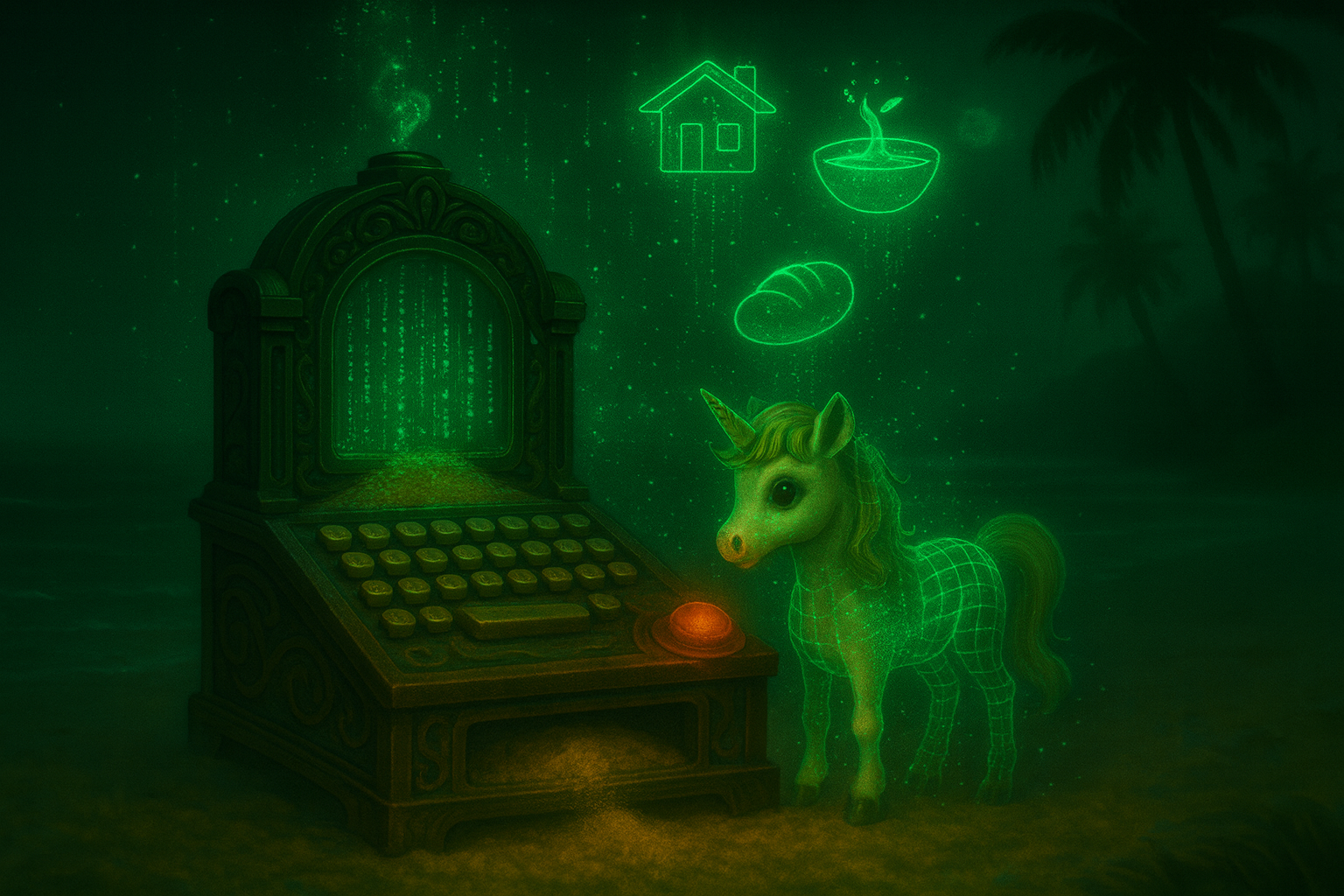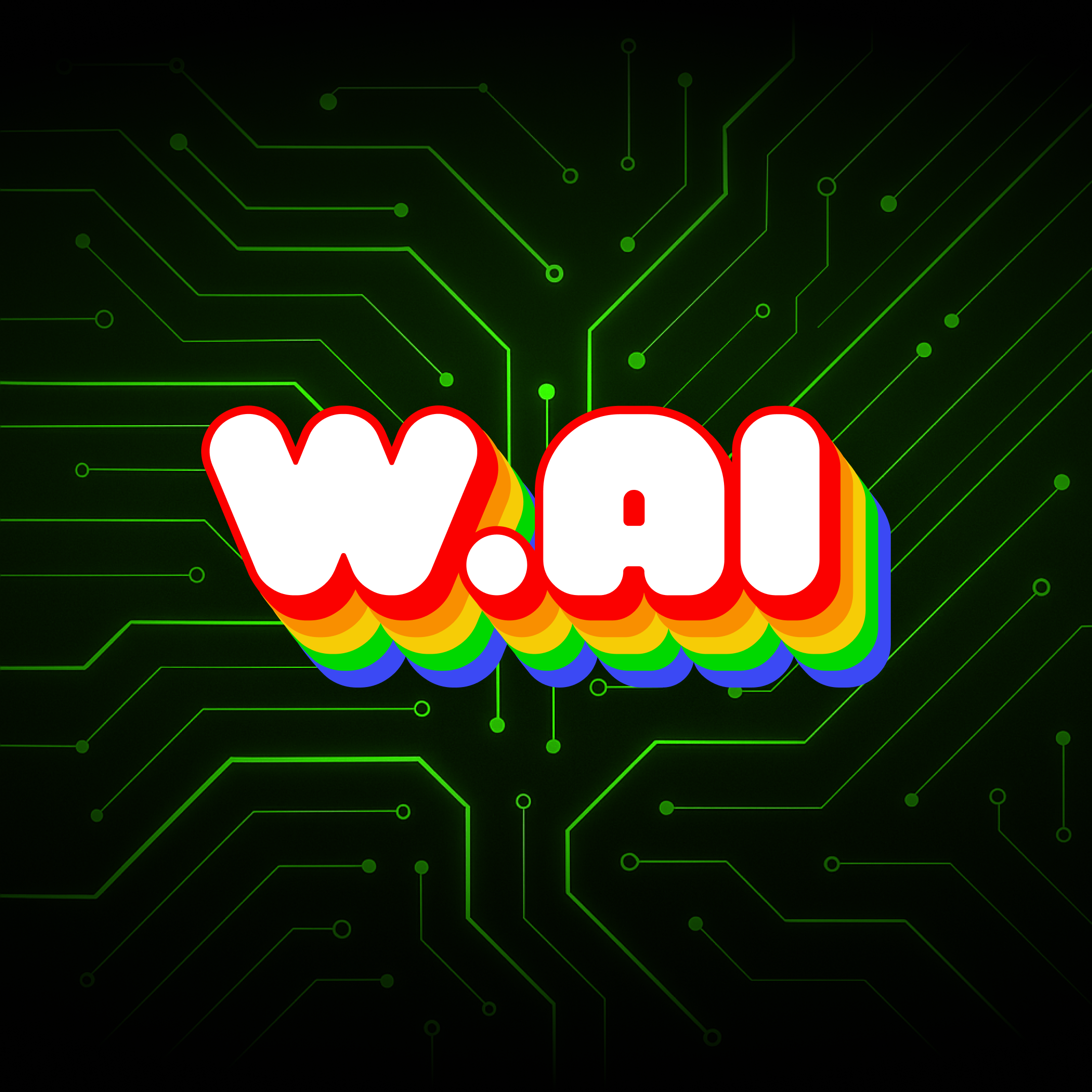


Why Decentralized AI Matters
I want you to imagine a group of people who were trapped on a desert island together. There was a decent amount of space for everyone to relax on their own corner of the island, a few palm trees for shade, and a small oasis in the middle with fresh water. Life was good for a while, but it could be much better…
One day, the people discovered a MAGICAL MYSTERY MACHINE sitting on the beach.

After some experimenting, the people discovered that the machine ran on sand as fuel. By filling the machine with sand, typing anything on the machine’s keyboard, and then pressing the button - out would pop whatever you had just typed!
Homes, food, water, ponies, literally anything- poof!

The future could play out for our island dwellers in two ways…
SCENARIO 1:
One island dweller, Mr. Scam Assaultman, declared that the machine belonged to him and he built a fence around it. His first order of business was of course fortifying the fence and popping out a couple of weapons to make sure nobody could challenge his position.

He then delegated responsibilities to the rest of the people on the island: some people would collect the sand for the machine, others sat down and wrote all the ideas of what they wanted the machine to create… but only mister Assaultman could press the button, and he controlled everything that popped out of the machine.
He rewarded the sand gatherers and idea creators with tiny morsels of food that allowed them to survive, but not much else. Out popped mansions, babes, and tons of ponies- but they all belonged to mister Assaultman, and he didn’t like sharing. After all, there was nothing anyone else could do- only he could press the button, and everyone was now dependent upon him for survival.
SCENARIO 2:
The stranded people decided to work together. They each had something to contribute: some gathered sand and shoveled it into the machine, others brainstormed things to ask the machine to create to make their life on the island more comfortable, still others would evenly distribute whatever the machine created… but EVERYONE had a right to press the button.
Life on the island was fantastic- homes were built, delicious food created and distributed, and society thrived.

Well, the “MAGICAL MYSTERY MACHINE” is real. It's the AI revolution we’re living through, and it’s getting better every day. The big question remains: when it gets here who gets to press the button and on what terms?
DECENTRALIZATION
When you say the word “decentralization” or “crypto”, most people’s eyes glaze over and they’ll discount whatever you say next as nerd-speak and a scam. But at their core, most people agree with the core tenets of decentralization - that nobody should have enough power to control a whole system, whether it be politics, religion, finance or AI.
Most people are also coming around to the fact that AI systems are being developed at neck-breaking speed and that AGI (Artificial General Intelligence, or an AI system that is independent, agentic, and capable of self-learning and self-improvement) is only a few years away.
We are confident that AI will be the most powerful tool humanity has ever created, and the limits to what it can achieve or create are not known yet.
Most think of AI as a “magical mystery machine”, and they aren’t totally wrong. AI systems are doing things we previously thought impossible, like performing sequential diagnosis better than leading physicians with 85.5% diagnostic accuracy compared to 20% diagnostic accuracy, outperforming human lawyers on almost all benchmarks, and vastly outperforming therapists based on client ratings. If this is what public-facing AI looks like now, then one can only imagine where we will be 1, 2, 5 years from now. It’s hard to conceive of what exactly superintelligence will look like or what it will be able to do, because even our imagination is limited by our own finite intelligence. Miracle drugs, galactic exploration, life-like simulations… we haven’t been able to even scrape the surface of what will be possible.
This will be a tool with such a vast amount of power that the world has never seen before, that we ought to be diligent about WHO is in control and HOW that power is distributed.
We believe that no single person, small group of people, or organization should have exclusive access to AGI.
And while everyone has “access” to AI systems now, we know that there is an extremely high likelihood that this won’t be the case in the near future. Why? Because we don’t decide who gets to press the button and who doesn’t - they do.
When compute (the work your computer or graphics card can do) is centralized, research and interaction becomes economically gated. Most people won’t have the compute power necessary to run the future cutting-edge AGI systems, and thus will be entirely dependent upon centralized entities that do to allow them access.
When AI models are centralized, then the creators of the models get to decide what the outer “bounds” of the models are. They can be tailored to political means (e.g. an AI model that only gives propaganda outputs that serve to promote the wellbeing of X country, party, or group) or personal means (e.g. an AI model that maximizes addiction + spending in order to get people hooked on interaction and give the model creators money and control).
When data is centralized, people’s human rights are stripped and they are liable to be manipulated against their will. Centralized data leads to (unwanted) targeted advertising, addiction bait, and IP theft. Imagine every AI prompt you ever typed in, every google search, everything you’ve ever put into a computer… is taken and plugged into a cutting edge AGI model that perfectly mimics you and renders your input worthless. Where would that leave you?
The centralized frontier AI entities that exist today are an existential threat to future equal access to AI, and we are fighting back by establishing a decentralized, joint-ownership AI system where everyone who contributes = owns.
We all have things to contribute- data, compute, our humanity… And while the traditional financial systems of today are set up to extract without giving any value back, we believe in a better decentralized future for AI where contribution isn’t rewarded with morsels, but real ownership.
AI systems have several inputs necessary to function (compute, data, models, model weights, distribution, etc.), and at w.ai, we are beginning with the consumer-focused decentralization of compute, with the end goal of training our own frontier decentralized AI model that will be co-owned by all of our contributors (including you!).
Here’s how we are going to do it:
Decentralized compute system development + decentralized frontier AI model development + decentralized co-ownership of frontier AI model.
Decentralized Compute System
By decentralizing compute systems and allowing people to contribute the compute they already have (and get rewarded for it), we will be able to amass enough compute to both develop and run cutting-edge AI models. While your Macbook won’t be strong enough to run a future AGI model on it by itself, it will be able to run a fraction of that model within a connected ecosystem and contribute in an invaluable way. This is made possible through parallelism.
Frontier AI Model Development
To train a decentralized frontier AI model that can compete with with the big centralized guys, we must execute on three forms of parallelism to utilize a large cluster of accelerators/GPUs:
- Tensor parallelism: a single weight matrix is too large and so a single layer (a convolution or a dense etc.) is split across multiple GPUs and then accumulated together. This needs high bandwidth / communication amongst the nodes involved.
- Pipeline parallelism: different layers in a model are placed on different GPUs, sort of an assembly line, where data moves from one layer to another.
- Data parallelism: the training set if so large that in each epoch, you split each batch into "micro-batches" and so different GPUs see a different subset/% of the overall data in each epoch and you only synchronize across all GPUs once every Y epochs.
The programmatic coordination and validation of these parallel systems will not only allow us to keep pace with centralized entities, but eventually overtake them entirely due to distributed cognition and ensemble effects.
Decentralized Co-ownership of frontier AI model
By rewarding all contributors within a decentralized ecosystem, we can not only incentivize desirable actions (such as research, compute contributions, or data contributions) with cryptoeconomic liquidity, but co-ownership.
When AGI is achieved, what if YOU got to decide what to type in, and YOU get to push the button?
At w.ai we want to decentralize development, contribution, and ownership as well, because ownership is at the crux of the centralized/decentralized power dynamic. Other systems might reward you for your data or compute, but at the end of the day if those systems become worth billions of dollars, do you see any benefit? No, because you aren’t an owner.
We believe that if you help build it, you should own a piece of it.
And when it comes to owning a piece of what will be the most powerful tool humanity has ever seen, you can’t really put a price tag on it.
Ownership means access.
Ownership means stability.
Ownership means freedom.
And for now, all of that is represented by the points ticking up minute by minute within your w.ai console, but soon it is going to be so much more, and we want you to know exactly where we are headed.
Over the next few weeks we are going to be publishing research on several other decentralized AI protocols that are trying to solve the same problem we are -> making sure AI development and access is decentralized, in the hands of all of us. We are going to be honest about the flaws we see, as well as the things other protocols are doing better than us that we can learn from. The deeper we dive into these other decentralized systems, the more we can learn, build with focus, and rapidly scale this co-owned decentralized AI movement.

We want to work together with anyone who agrees that the decentralization of this technology will be the most critical juncture humanity has ever seen- and our hope is that this includes you.
Contribute today in three clicks at w.ai.
HOW W.AI WORKS


Download & Install
Get set up in minutes, it’s so easy your grandma could do it (seriously).

CONNECT & START EARNING
Let your device earn while you work and go about your life.
track your REWARDS
Watch your rewards grow and follow the journey towards an AI future that prioritizes humanity.
FAQ





manifesto

w.ai: The Global AI Supercomputer
The immense power to reshape reality is consolidating within closed labs and datacenters, controlled by narrow interests. This path guarantees fragility, misalignment, and risks a future defined by digital serfdom, not shared progress.
Humanity requires a different foundation. An open, globally distributed compute substrate is not merely preferable; it is the essential architecture for navigating the intelligence explosion safely. The window to build this alternative closes with exponential speed. Delay is abdication.
w.ai is this architecture. It is the open substrate. We are building the peer-to-peer protocol for the Global AI Supercomputer. We are unifying the world’s idle processing power into the planetary foundation necessary for Decentralized Superintelligence (DSI). We move intelligence from silos to the shared mesh.
Trillions of dollars in silicon sit dormant. Billions of devices hold a latent power. This collective force, once awakened, is destined to challenge any single centralized build. w.ai activates this power with a radically simple one-click client engineered for mass adoption. Frictionless contribution, unparalleled reach.
Our singular mission: forge the foundational compute substrate for DSI, ensuring intelligence serves humanity’s collective potential. We begin pragmatically, running real-world AI inference to prove viability and build network density. This establishes the essential base layer for the complex distributed AI tasks ahead.
The future of intelligence must be built, not inherited. Awaken the Global AI Supercomputer with w.ai. Contribute your idle resources. Become a co-owner of this critical infrastructure. Actively participate in building an open intelligence future.
- The w.ai Team
back to top




